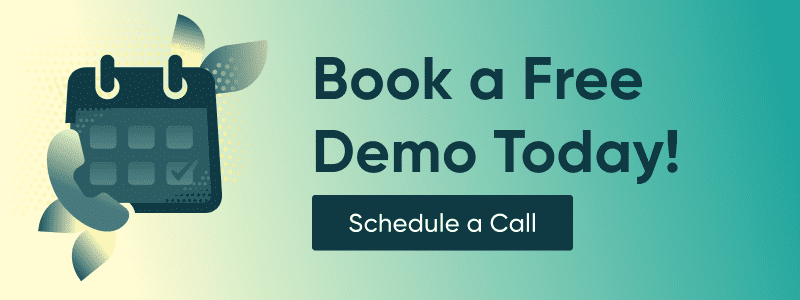Data Governance Software: Our Top Picks for 2024 [Expert Review]
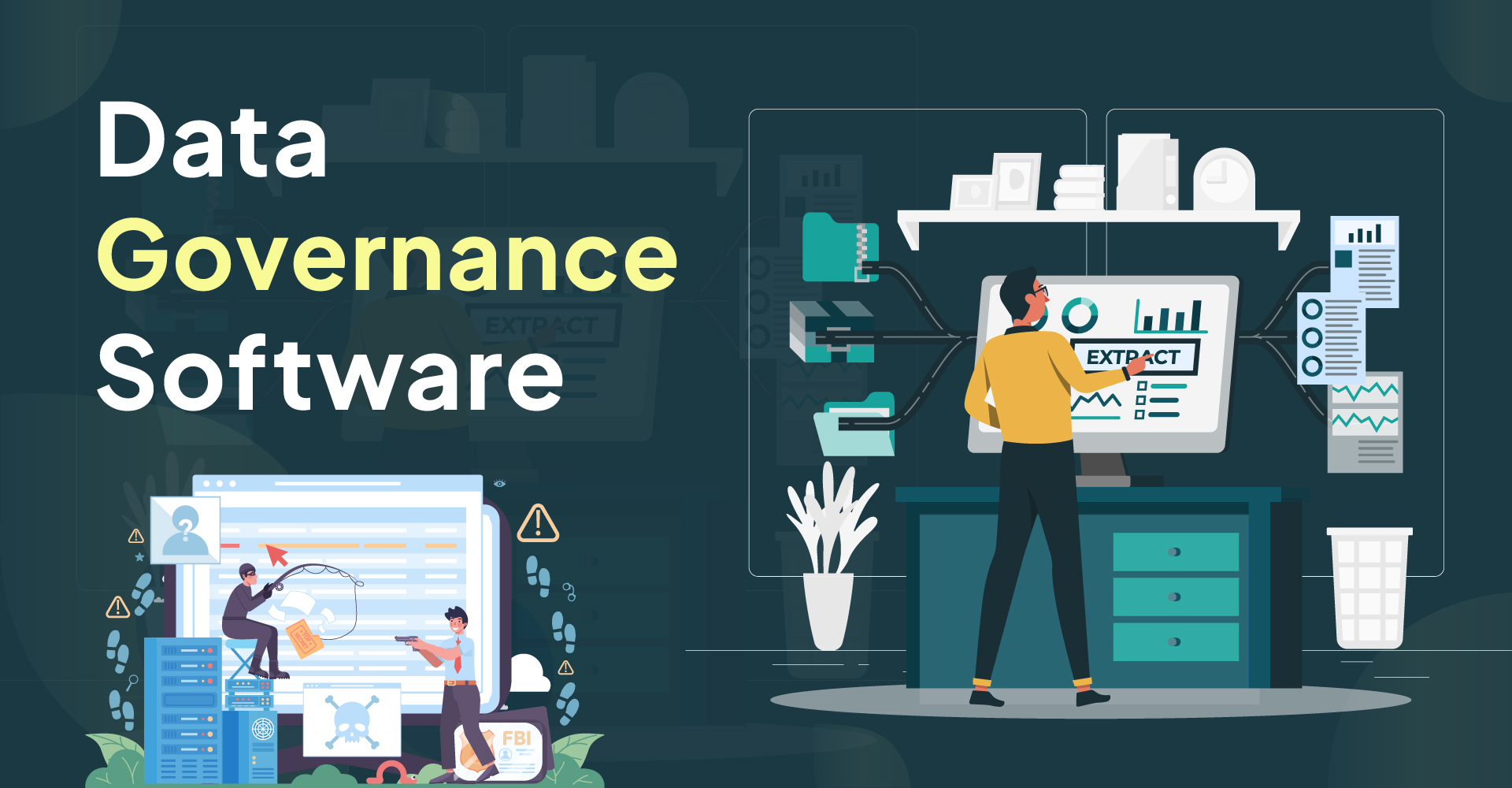
Table of Contents
Best Data Governance Tools and Software
Implementing a corporate data governance plan seems to be a daunting task. However, some frameworks simplify the process of imposing data governance in an organization.
Data governance is the practice of ensuring that your company's information is secure, available for appropriate use, and accurate. Whether your business is already well managed or you are responsible for bringing order to a chaotic enterprise, you will need a data governance tool to ensure that logging and documentation are in place.
Your data governance requirements might be driven by the conventions of a particular industry or the legal stipulations of a country in which you operate. In that case, you will already have a specific data protection standard in mind and must ensure that your data governance platform can prove compliance with it.
An entire industry has evolved to provide effective data access controls and activity tracking. So, once you know the standard you need to aim for, you have to investigate which data governance software will provide your data protection controls without disrupting legitimate business processes.
What is a data governance program?
Data governance is the glue in the GRC model kit. “GRC” stands for “governance, risk, and compliance.” You need to analyze risk concerning compliance and mitigate it with governance. Reduce risk and enforce the requirements of data protection standards through compliance implemented with governance.
You don’t have to implement data governance with a specialized piece of software – some data management systems have compliance built in. However, if you rely on your data management software for your governance, you are increasing the risk to your business because that software might not provide enough controls.
Effectively, data governance solutions ensure that your working practices, operations software, and employee training fully meet your obligations. Your company’s responsibilities extend to demonstrating risk reduction to associated businesses. Your governance strategy must also ensure that your service providers do not represent a data security risk.
To summarize:
- Data risk management – Identifies sensitive data and how it can be tampered with or stolen
- Data compliance management – Enforces data protection through access controls, data privacy and security, and activity tracking
- Data governance – Verifies that compliance management tools are effective and appropriate, implements internal audits to confirm data protection, provides tools to external consultants for compliance auditing, and serves data subject access requests (DSARs)
Ranking criteria of data governance software
The market for data governance software is becoming very crowded and researching all of the options available is going to take you a lot of time. Rather than fully researching all of the data governance tools available, you might be tempted to cut the task short by just picking one of the first few that come up in a “data governance solutions” query on a search engine.
Fortunately, we’re here to help. We have done all the legwork for you so that you don’t have to skimp on the scope of your investigation. The first step in ranking data governance software is to define the qualities needed in a useful governance tool.
Here are our ranking criteria for data governance software:
- Governance and compliance guidance
- A platform that is easy to enroll in
- Off-the-peg security templates
- Adaptability to conform with different data security standards
- A system that manages data subject access requests (DSARs)
- A compliance auditing and reporting service
- Nice to have a data governance tool that is bundled in with risk and compliance management systems
- Scaleable pricing that makes the platform accessible to businesses of all sizes
Cloud-based systems are prevalent these days and you will find that all of our selection are cloud-hosted packages – mostly SaaS platforms.
With these criteria in mind, we selected the following tools for your consideration:
- Enzuzo – A consent management package for websites that includes a data governance module for compliance with GDPR, LGPD, CCPA, and CPRA as well as AI governance features.
- Collibra – Provides data management features that implement data quality assessments and data privacy protection with a specialized service for AI data.
- OneTrust – Sensitive data management, cookie consent management, and third-party risk assessments from a cloud platform.
- Egnyte – A data protection platform with governance features and a special angle on collaboration in the life sciences sector.
- Informatica – This platform supports businesses that want to use large pools of data for AI and it includes a data governance module.
- Securiti.ai – Enables different stores of data to be pooled for AI access and includes security, privacy, compliance, and governance services.
- BigID – A cloud platform of data security, privacy, compliance, and governance services.
- Ketch – This data management tool is strong on the privacy and consent issues that surround storing and using personally identifiable information.
Our Top Data Governance Tools
Let’s take a deep dive into each of our recommended data governance platforms.
1. Enzuzo (Best All-Round Solution)
The Enzuzo platform is based in the cloud and provides a cookie consent system for websites. The platform has many other features and more services are added on for successively higher plans. The top plan, called the Enterprise edition, includes a data governance system.
The base package provides a cookie consent form and website policy templates for pages such as Privacy Policy and Terms of Service. You can get the package free forever with the Free edition that provides the basic cookie banner that is required in many countries.
The Enterprise edition covers an unlimited number of domains and provides consolidated management behind the scenes. Thus you can administer multiple sites without having to log into different accounts.
The data governance system in the Enterprise plan provides an extensive DSAR management unit that enables the timely delivery of information in response to data subject access requests. All but the Starter and Free plans provide a DSAR form but don’t go further in DSAR management – the Enterprise plan provides full automation for that business function.
Features
Enzuzo’s data government services provide the following services:
- Asset scanning to discover sensitive data
- Data categorization that can be tailored to specific data protection standards requirements
- Data mapping to show the locations of PII
- Risk assessment service that provides a data risk score
- A Compliance Health rating that is calculated from automated system audits
- Third-party data access logging
- Extensive DSAR management
While the lower editions of the Enzuzo platform are easy to set up, the Enterprise edition is a little more complicated and you might need help. Fortunately, onboarding assistance from Enzuzo specialists is included in the subscription price.
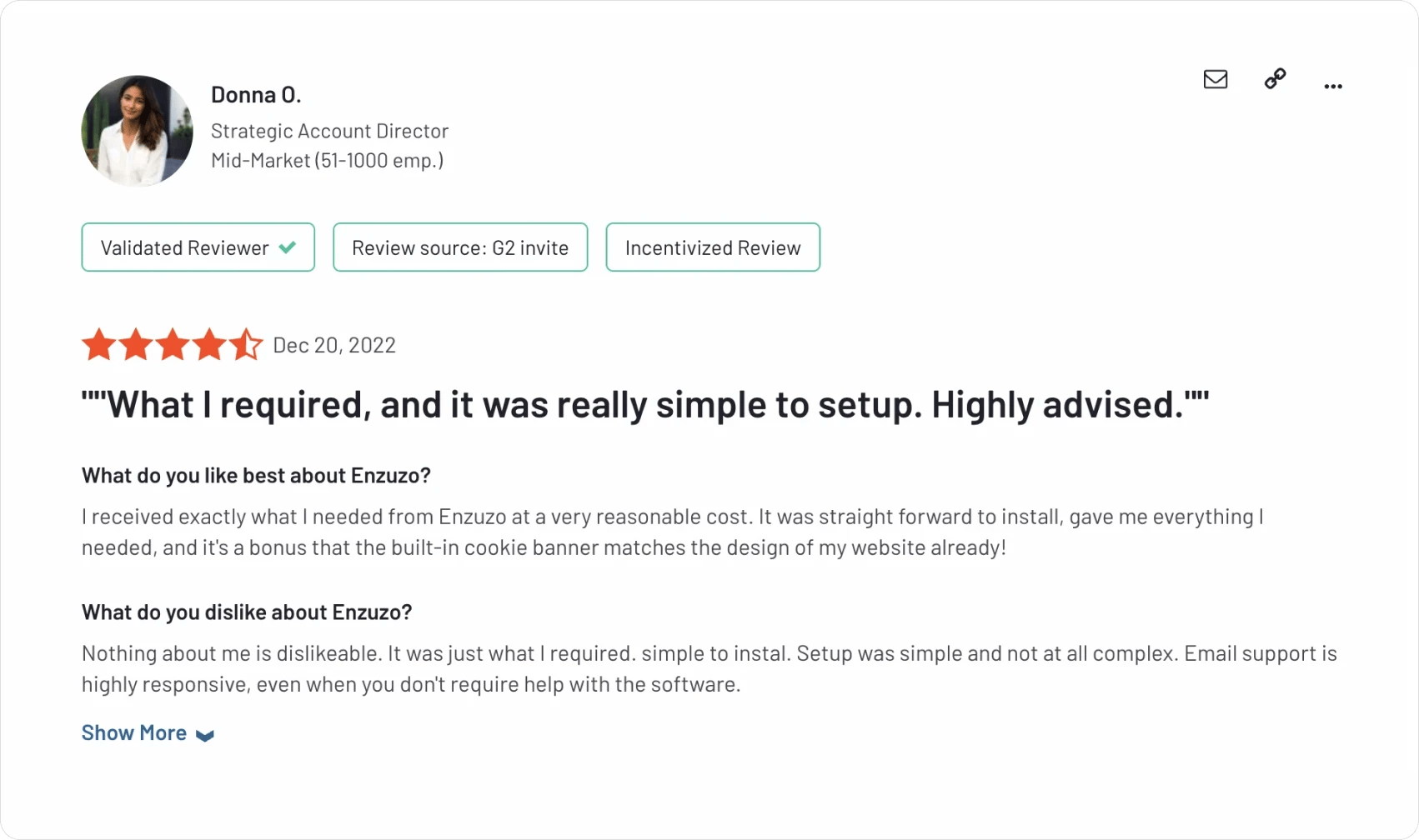
Data governance for GDPR
The General Data Protection Regulation (GDPR) in the EU has a number of stipulations that place extra obligations on data governance that relate more to working practices than data access. The most notable among these is that the location of data access has to be recorded. PII cannot be moved outside of the EU and so no user located outside that area can access, view, or process the company’s protected data.
The Entreprise plan tracks the location of each person working on your PII store. Thanks to work-from-home options and the digital nomad lifestyle, simply hiring people who are located in the right place isn’t enough – they can move. The Enzuzo system adds data location and user location to all access logs for compliance auditing.
Vendor Risk Management
Third-party risk assessments are an essential part of any sensitive data management system. The Enterprise edition of Enzuzo provides a template for assessing vendor risk. This process relies on self-reporting; you send out the inquiry form to each service provider and supplier and then rate their responses. This feature stores and scores responses, letting you know whether you need to replace any of your providers.
Automated Workflows and Guides
The console for Enzuzo includes a compliance assessor that defines the tasks you should implement to get the Compliance Health score up to an acceptable level. Automated workflows include a DSAR processing checklist that enables staff to respond to requests efficiently. The package also includes cookie consent management.
Multilingual Systems and Customizations
The Enzuzo system is available in 25 languages. This includes external communications, such as DSAR forms and the privacy pages and consent banners that the system generates for websites. This enables any business to easily deal with visitors and customers from the major nations of the world. Consent banners and privacy notices are adapted to the laws of the visitor and all of these displays can be customized in terms of font and color theme.
Customer Support & Onboarding
All Enzuzo plans are easy to set up, thanks to the self-guided compliance checklist and setup wizard of the console. The platform also provides a library of regulatory guidelines.
The lower plans of the Enzuzo system deal with cookie consent and the legal notification pages needed for websites. The services included with the Enterprise plan are a lot more complicated and so subscribers to that plan get whiteglove onboarding and the services of a dedicated success manager.
Compliance Management
The Enzuzo platform provides compliance auditing, thanks to its automated activity logging system that lays down an audit trail. The system will also provide you with a reporting engine that includes pre-written formats for compliance reporting.
Pricing
Enzuzo provides a free plan. However, that edition won’t give you access to the data governance module. You need to go for the top plan for the full set of services and implement data governance through the platform. Naturally, having more features than all the other plans, the Enterprise edition is the most expensive option on the Enzuzo platform.
Trusted by International Companies to Power Data Privacy
After a competitive bidding process, Enzuzo was recently chosen as the data privacy partner of Lucy Group — an international electric business that employs over 1,600 people across 5 continents and 12 countries.
A similar process saw Enzuzo winning the business of Power Corporation of Canada, a globally recognized management and holding company specializing in financial services across North America, Europe, and Asia.
Both organizations depend on Enzuzo for critical data privacy support and management.
🏆 Read how Global Conglomerate Lucy Group chose Enzuzo as its data privacy partner [Case Study]
Overall Thoughts
The Enzuzo platform is ideal for small businesses that run websites. It provides affordable plan levels and gives sites consent management and legally required pages without any hassle. Larger businesses will need to go up to the Enterprise edition, which is the top plan, in order to get a full data security and GRC solution. The platform integrates easily with Shopify, Webflow, Wix, and Wordpress.
The plan levels of Enzuzo start with a free edition and go up to a full GRC package. That range of service levels makes Enzuzo suitable for businesses of all sizes.
Learn more about how Enzuzo can assist with your governance and compliance needs. Book a no-obligation call with Mate Prgin, CEO👇
2. Collibra
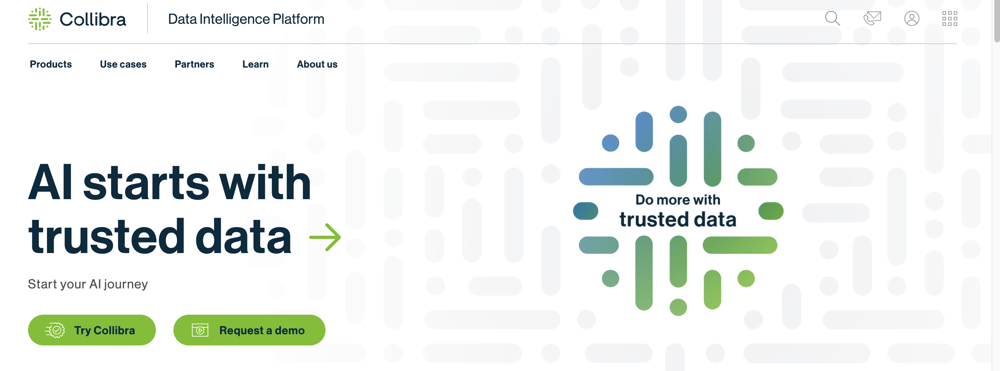
Collibra is a data management platform. This is a software package for installation on Google Cloud Platform or AWS. It provides a data framework that optimizes data access and can form the foundation for automated data processing and analysis. Collecting data and storing it raises issues of data quality and security. It also creates a need to examine exposure to data protection regulations and so requires data governance.
The Collibra system includes a data governance system that extends to compliance management. The package is best suited for new products because it includes a database design system and a data dictionary feature that enables AI processes and automated workflows to be built on top of data.
The benefit of the platform is that it will discover, categorize, and centralize all of your data. However, the downside of that is you are then completely reliant on the framework and it doesn’t always run smoothly:
Pros of Collibra
- Removes data from local stores
- Creates a central data repository
- Simplifies the enforcement of security
Cons of Collibra
- Requires planning
- Long lead time
- Software known to have bugs
Overall Thoughts
Collibra's cloud platform manages data access but promotes the removal of the need for direct access to data by providing integration with data mining tools. The system promotes the centralization of data, which provides an opportunity to remove duplicate data and eliminate local copies that could be open to abuse. The data store provided by Collibra is secure and controlled by an access rights manager.
The security for the central data store in the form of encryption and access controls are necessary elements for data protection standards compliance. Other compliance features include usage activity tracking and logging. The main attractions of the Collibra system are its data management and processing automation systems. The compliance and governance services that are built into the package make this an appealing system for businesses that need to conform to standards such as GDPR, HIPAA, SOX, and PCI DSS.
3. OneTrust
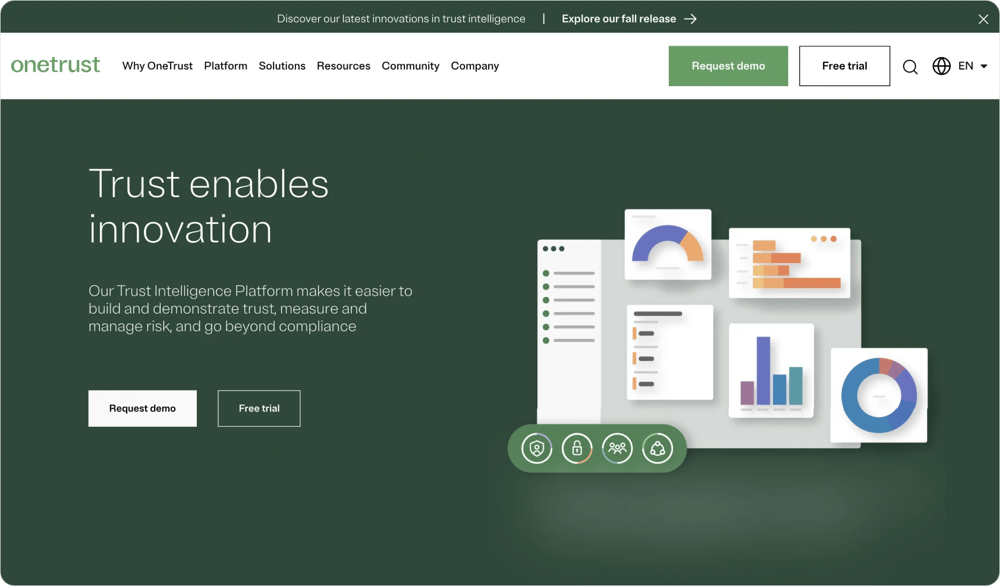
OneTrust offers three cloud platforms that all implement data governance but each with a different industry aim. For example, one of those options is designed for ESG and Sustainability program management and another is the Ethics & Compliance package. Probably, the most demanded package on the platform is its Privacy & Data Governance platform.
Subscribers to the cloud-based Privacy & Data Governance platform get data discovery and categorization. This is a sensitive data management service that can be tuned to implement specific standards, such as GDPR, HIPAA, or PCI DSS. This bundle also provides consent management and DSAR processing features.
This is a big system and it can sometimes be a little overwhelming.
Pros of OneTrust
- Data discovery, categorization, and mapping
- Compliance checklist and score
- Consent management and DSAR portal
Cons of OneTrust
- No on-premises option
- A customizable package that takes time to design and set up
- No price list
Overall Thoughts
The list of data privacy regulations keeps expanding. Currently, you might need to deal with GDPR in the EU, California’s CCPA and CPRA, Virginia’s CDPA, Brazil’s LGPD, Canada’s PIPEDA, and South Africa’s POIA. OneTrust is able to manage compliance with all of these systems and keeps adding on new capabilities as more regulations hit the statute book. If you operate a website that caters to a worldwide audience, you may well have to comply with all of these standards simultaneously.
In addition to the general rules for protecting personally identifiable information (PII), this package can also manage compliance with industry-specific data protection systems, such as PCI DSS, HIPAA, and SOX. Before you inquire about the package, keep in mind that this is a high-end system that even provides the services of legal consultants, so you can expect that your ideal package will have a high price.
4. Egnyte
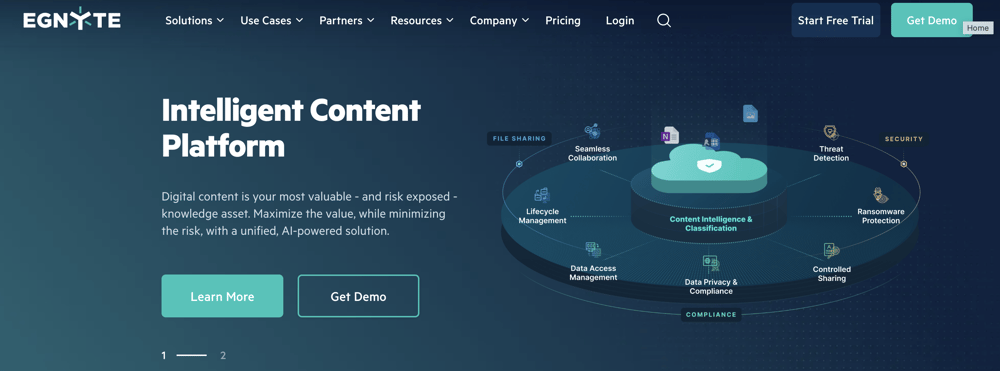
Egnyte is a data security platform that promotes safe file sharing. This service is a cloud system that is delivered in the cloud. It is offered in three editions and two of those – Enterprise and Enterprise Lite – include a Data Governance module. This module enables an administrator to create a security policy and apply it across all data stores. It will also tag and archive records that relate to legal issues.
This package is designed to protect cloud storage systems. It manages user access to files and mediates charing through mechanisms such as file locking. The platform enables files to be recovered even if they are overwritten or deleted. The top plan includes a DSAR fulfillment unit.
Egnyte maps the locations of existing files. It doesn’t consolidate data stores, and so doesn’t eliminate duplication of insecure shadow copies. The system can be difficult to use:
Pros of Egnyte
- Sensitive data discovery and classification
- File protection with version rollback and deletion recovery
- Access controls
Cons of Egnyte
- Controls other cloud storage platforms
- Leaves files in place, which allows the complication of multiple copies
- No price list for platform plans
Overall Thoughts
Egnyte provides an index of existing documents by searching through all of the storage locations used by your enterprise. The package then manages access to those files through its own access rights manager. The main purpose of this platform is to enable safe file sharing and collaboration. It prevents a single document from branching into several copies when multiple people work on the same data; it locks a file while one user is editing it. The tool also preserves previous versions, which enables rollback or even recovery if the file is accidentally deleted.
Privacy and governance features are optional and not included in every edition. The privacy system searches all data stores and identifies sensitive data, classifying it and logging it in a register. The tool also supports the creation of a security policy and then enforces it. However, the system does nothing about multiple file versions that already exist and it isn’t able to lock, delete, or manage the shadow file copies that productivity tools such as Word regularly create for the purposes of document recovery.
5. Informatica
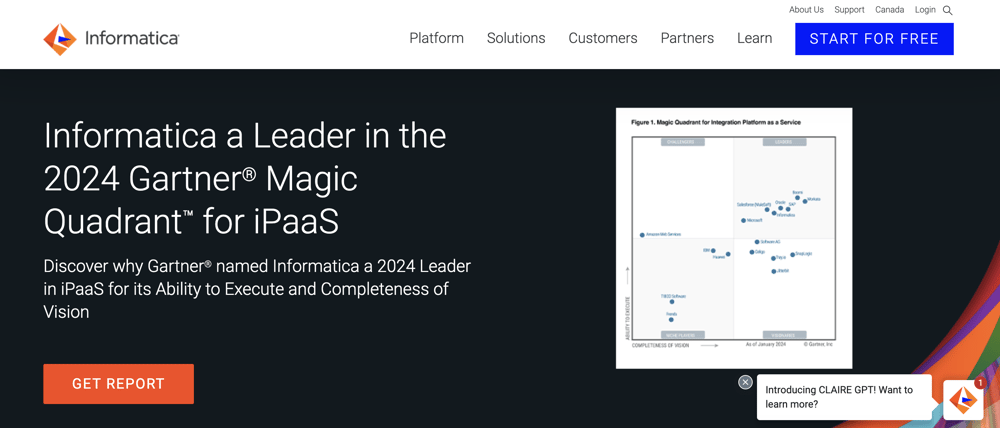
Informatica Intelligent Data Management Cloud includes a Cloud Data Governance and Catalog unit. This is similar to the Egnyte system in that it locates all data stores and creates a content access page. So, users access a file through the Informatica interface without needing to know exactly where it is stored. The system specializes in managing cloud drives.
As it is a gateway through to data stores, the tool can impose access rights. It is also able to track activity, which is a data governance task. The package scans all of your data locations with an option to mark specific content for specific usage. However, it should be noted that this is not specifically designed to protect sensitive data.
Informatica aims for the lucrative AI and big data analysis markets, which is a rich sector and the package is a little pricey:
Pros of Informatica
- Provides a portal to distributed data storage
- Specializes in indexing multiple cloud storage accounts
- Provides tagging opportunities
Cons of Informatica
- Not designed for sensitive data discovery
- Sensitive data categorization is possible through the manual creation of templates
- An expensive system
Overall Thoughts
The Informatica Intelligent Data Management Cloud is not specifically designed for sensitive data protection. However, its mechanisms should enable a data manager to set up classifications for PII, PIA, and credit card data through its tagging utility. The tool is designed to pool data that is held on different cloud accounts and it also manages access to that data. The package enriches data by examining information quality and removing data duplication.
This is an expensive tool and it requires technical support staff to set it up, so it isn’t an option for small businesses. However, large companies and data-based enterprises will find Informatica essential for managing their data mining projects. The service can enforce access and security through its cloud-based portal. The package enables the creation of trust zones, so you can place files in a public space for general access while keeping more critical data secret within the organization.
6. Securiti.ai
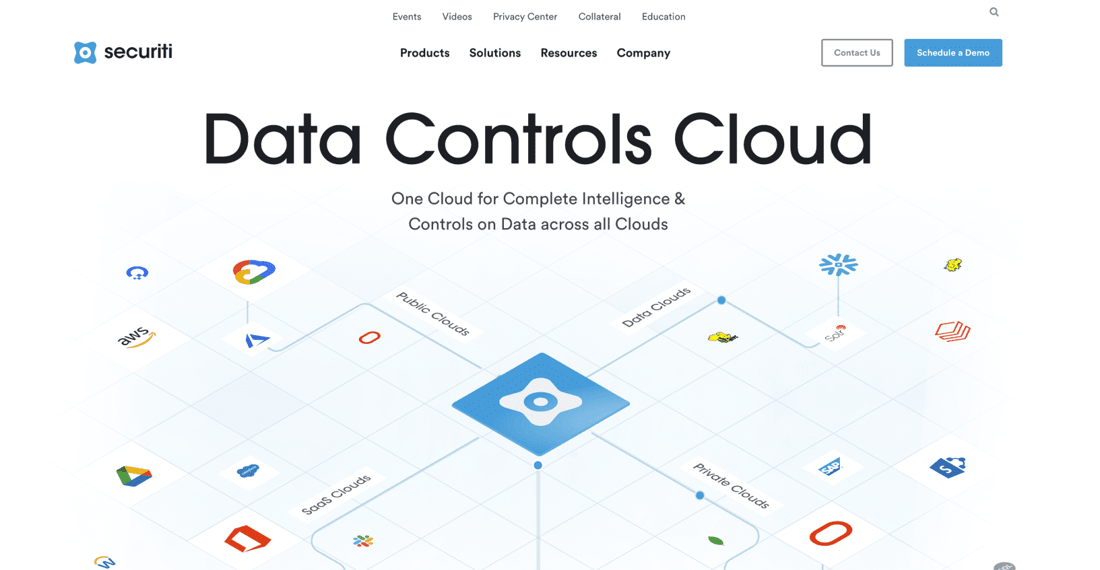
Securiti.ai is a cloud platform that coordinates access to data, providing the tool with opportunities to control and record access. The tool includes a data discovery process that will also categorize sensitive data. The system also identifies the shadow copies that productivity suites store for document recovery and change reversal. The package integrates with well-known data handling and management tools, such as Oracle, Apache Hadoop, MongoDB, and Google BigQuery.
The system focuses on access to data by applications and so relies on tight access rights management being implemented for those packages. The system focuses on access to cloud stores of data by cloud-hosted applications. It even allows file sharing. The key feature of the platform for governance purposes is its activity logging.
Pros of Securiti.ai
- Discovers sensitive data including shadow copies
- Identifies system configuration weaknesses
- Access analysis and logging
Cons of Securiti.ai
- Doesn’t control access to data – relies on application credentials management
- No on-premises hosting option
- No price list
Overall Thoughts
Securiti.ai is a great choice for businesses that store their data on cloud drives and use cloud SaaS packages for their office software. The package removes a lot of the complexity of data access control by offloading a lot of that responsibility onto the credentials management features of the applications that the company uses.
The Securiti.ai system is able to identify and categorize sensitive data and then track access to it and log changes. The service is also able to support file sharing and will record the actions of each contributor. The platform includes consent management for website visitors and also provides workflows to handle DSARs.
This platform is suitable for small businesses and it isn’t too difficult to administer. Annoyingly, Security.ai doesn’t offer a free trial and it doesn’t publish a price list.
Evaluating sensitive data management software? Check out our other lists:
👉 Best Data Privacy Management Software
👉 Best Third-Party Risk Management Tools
👉 Best Regulatory Compliance Software
7. BigID
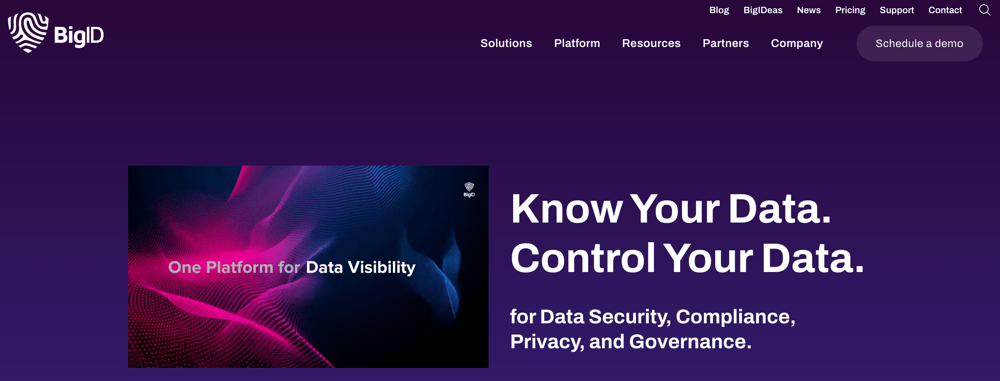
BigID is a data management platform that covers on-premises and cloud-hosted data. The system itself is a cloud-hosted SaaS package. The bundle of tools includes data discovery and classification but the system doesn’t move your data to a central repository. Instead, it keeps track of all files and databases wherever they are. It is able to scan through emails, applications shadow file stores, file servers, relational databases, NoSQL databases, and big data storage accounts.
The service classifies data according to specific data protection standards requirements. The system uses a range of strategies to detect sensitive data, which enables it to scan through unstructured data and spot data sensitivity that only occurs by combining fields that are stored in the same file. The platform also includes comprehensive consent management DSAR fulfillment services
The platform is an attractive package. However, it’s not all good news. Many users warn that the system has bugs and that the Customer Support team is a little overwhelmed, slow to respond, and takes time to fix problems. Another constant theme in reviews is that many find the tool expensive.
Pros of BigID
- Suitable for HIPAA, GDPR, PIPEDA, LGPD, CCPA, GLBA, POPIA, and CPRA, and other data privacy regulations
- Sensitive data discovery that crosses platforms
- Strong consent management and DSAR processing
Cons of BigID
- Reported to have a lot of bugs
- Customer Support team are slow to respond
- Said to be expensive
Overall Thoughts
BigID is a relatively new system and it is still running in. It is notable that although many users warn of bugs and a slow Customer Support service, they all love the platform. The company doesn’t publish its price list, which is also a detraction for small businesses researching new tools. Many users strain at the price of the platform. However, it has to be pointed out that they still went ahead and signed up after learning the price and they still recommend the system to others.
BigID is able to secure entire data centers, so this is designed for use by large businesses. The sensitive data package is able to account for a long list of national data privacy regulations, so it is a good choice for multinationals and websites that serve international customers.
8. Ketch
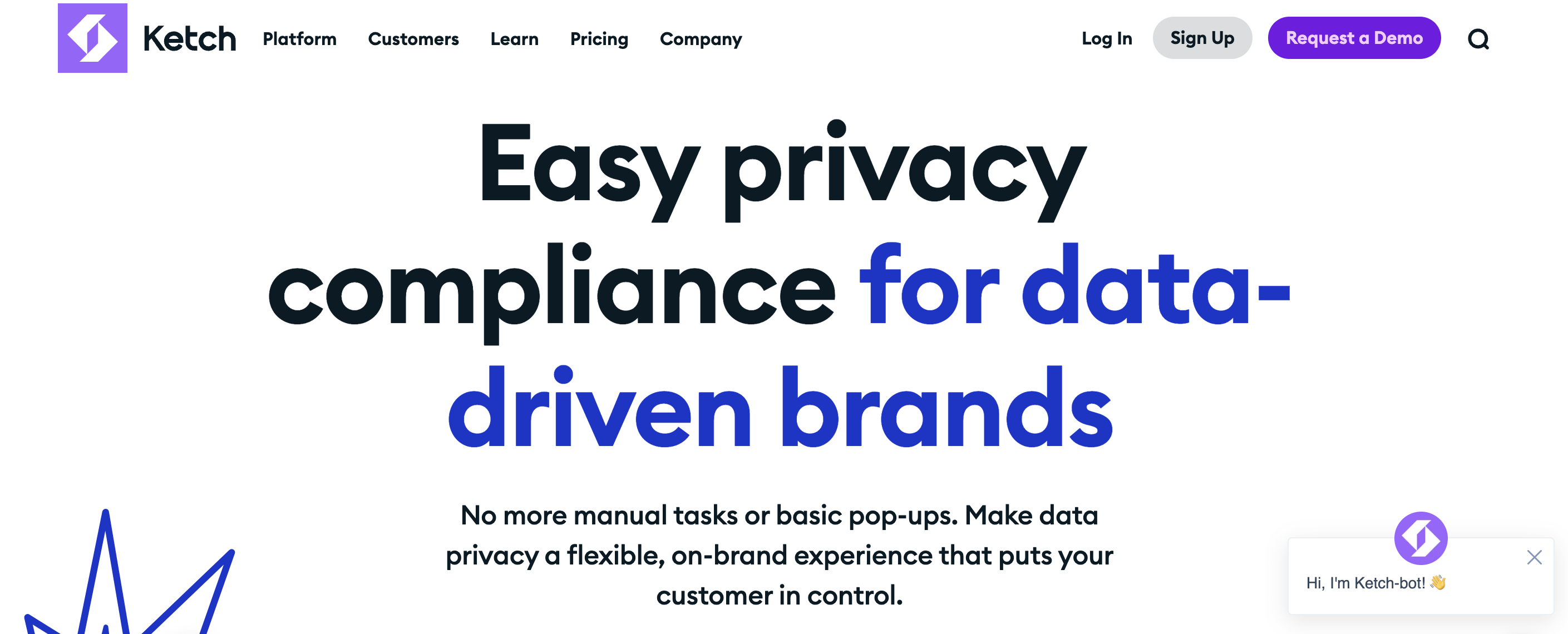
Ketch is a relatively new data management platform. The tool already has an enthusiastic user base and is popular with small and mid-sized businesses. This is a cloud-based package and the company provides three editions that broaden its market. Even better news is that there is a Free edition. Ketch Free is a straightforward consent and cookie banner generator and won’t help you with any of the tasks of sensitive data protection or data governance.
The lower of the two paid editions gives you data discovery and classification plus a more comprehensive consent collection process than the free plan offers. The system’s consent management module extends to DSAR automation that adapts to the regulations that are relevant to the data subject’s location. The top plan also provides data access assessments for developers and business planners. That edition also includes marketing preference management.
While generally being satisfied with the Ketch package, users report a few annoyances. The most frequent complaint is that the user guides and system documentation are not sufficient. However, those complainants also attest that the Customer Service team is quick to help and fill in the gaps.
Pros of Ketch
- Free plan for consent and cookie banners
- Data discovery and classification
- Automated DSAR management
Cons of Ketch
- Poor system usage documentation
- No compliance management
- No price list
Overall Thoughts
The Ketch system is a good choice for consent management and DSAR processing. However, it doesn’t provide a full suite of sensitive data management tools. It doesn’t include any data protection measures or data file change tracking features. You also won’t find compliance management or many data government analysis features in the platform.
Ketch doesn’t publish a price list. While there is no free trial for the paid editions, you can get demos of them.
What does data governance software do?
Data governance software is a component of a GRC platform. The full remit of a GRC program involves examining working practices and providing training to users. However, users may very well ignore that training and try to continue their previous, careless attitude to data management. Therefore, correct working practices need to be enforced.
The easiest way to enforce correct data management practices is to implement them in compliance software. This might be built into data storage systems, access rights managers (ARMs), and user behavior analytics (UBA) analyzers.
Governance software checks that compliance systems are working effectively. You need to be able to audit data access activity, confirm that data is held securely, is only accessed by the right people, and only used for appropriate activities. Other features that need to be provided include the proper handling of data subject access requests (DSARs) and confidentiality through redaction.
Two important features of data protection standards are that companies can be audited by an external inspector and that they are able to spot data breaches and notify the authorities and data subjects of the problem. These two requirements are addressed by data governance.
The activities of compliance management and governance are very similar and the definitions of the two fields can overlap. A basic rule of thumb is that compliance systems enforce data protection by restricting the possible actions of users and data governance tools confirm that controls have successfully protected data.
What are the benefits of data governance?
There are many benefits of data governance and they all fit into three broad categories:
- Regulatory conformance: Data protection is mandated in many areas of the world. Failure to comply with these requirements can result in sanctions and fines. For example, in the EU, companies that breach GDPR requirements can be fined up to 4 percent of their total global turnover (not profit).
- Market participation: Part of the risk assessment for GRC includes third-party risk and companies that can’t provide excellent data governance credentials will lose business. The reputational damage caused by a data breach or bad data management loses a business its customers in the general population.
- Data quality: Most businesses hold data in multiple locations and this can result in duplication and confusing inaccuracies. Implementing data governance provides a framework for data management that clears out unnecessary data storage, removes duplication, improves accuracy, declares a comprehensive data retention policy, and ensures that data access is meaningful and purposeful.
A data governance platform prevents the negative consequences of poor data management and enhances the positive business improvement strategies of good data management.

Osman Husain
Osman is the content lead at Enzuzo. He has a background in data privacy management via a two-year role at ExpressVPN and extensive freelance work with cybersecurity and blockchain companies. Osman also holds an MBA from the Toronto Metropolitan University.
